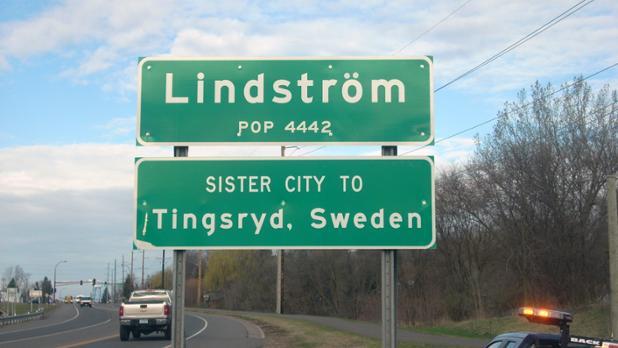After a little political pressure, Lindström, Minnesota, gets its Ö back
Lindström's motto is America's Little Sweden. The town was distressed when it lost the dots over the o in its name — the umlaut. They were restored Thursday by executive order of Minnesota Gov. Mark Dayton.
The Minnesota Gov. Mark Dayton issued a quirky executive order on Wednesday concerning the spelling of the name of the small Minnesota city of Lindström (population, 4,442).
Somehow, it seems when highway crews last updated the road signs leading into town, they removed those little twin dots that hover over the O. Lindström became Lindstrom. The transportation department defended the decision, citing federal policy that highway signs include only letters in a standard alphabet.
The omission wasn’t much noticed, though, until a Minneapolis Star-Tribune reporter spotted it. Soon enough, many of the town’s Swedish American residents were up in arms. They wanted the dots restored to reflect their heritage.
Keep in mind that the city of Lindström is nicknamed America's Little Sweden. Many locals speak Swedish when buying Scandanavian donuts at the local Swedish bakery. A sign near the city center reads “Välkommen till Lindström.”
So on Wednesday, the governor predictably set things right by ordering the umlaut to be put back on the green highway signs that welcome tourists. "Nonsensical rules like this are exactly why people get frustrated with government," Dayton said. "Even if I have to drive to Lindström, and paint the umlauts on the city limit signs myself, I'll do it."
“Underbar, and that means wonderful!” said local historian and tour guide Sally Barott reacting to the governor’s order. “We are ecstatic he’s making the umlauts come back.”
Barott says the dots affect the pronunciation and, more importantly, express the region’s cultural history and link to Swedish immigrants. “It’s important," she says. “We have the old and the new. The blend is happening all over America, but I believe being able to retain our history and cultural ways, and to recognize and be traditional, honors the way we were taught and the way it was meant to me.”
Barott regularly escorts tourists around the city that was founded by Swedish immigrants back around 1850. One of her favorite stops is the Lindstrom (or is it Lindström?) Bakery where she orders Swedish glazed donuts and Swedish gingersnaps, called pepparkakor.

Those gingersnaps have likely just come out of the oven, thanks to baker Bernie Coulombe, the woman behind the counter.
“This is a Swedish town. It has always been known for the Swedish settlers who first came here. So it is important to our customers and people who live here,” she explains. She says the town proudly shows off its heritage to tourists with a statue of Karl Oskar (a character in Vilhelm Moberg’s novels about Swedish emigration to the United States) that honors the early Swedish immigrants. There’s also an old water tower that’s in the shape of a coffee pot and a small Lutheran church that’s “strictly Swedish.”
But Lindstrom isn’t just hanging onto the past. “This is the way we were brought up, this is our Swedish inheritance, and you’ve got to keep your inheritance going,” says Coulombe.
This case of what might be called Lindstrom’s “umlautgate” is on the radar of The World’s language editor Patrick Cox. “Generally speaking English is thought of as the language where diacritics go to die.” All of the accents and the dots usually disappear, he says.
“America is the place where when you come to America, you sort of drop your clothes from the Old World and you embrace the New World. Names, surnames get changed, also the names of towns and cities get changed, and generally speaking the accents go.” But keep in mind, he says, “there are no rules in the English language right? I mean nobody’s going to stop the governor of Minnesota from saying 'throw in some Cyrillic letters if you want to do that.' He has every right to issue a decree like this.”
But if you want to learn more about the linguistic difference between Lindstrom and Lindström, or the distinction between an umlaut (which has its origin in German) versus the happy twin dots that show up in Swedish words, and hear why rock bands ranging from Blue Öyster Cult to a Ukrainian band named Flëur like to play with umlauts, then you really must listen to Patrick’s podcast, The World in Wörds.
Every day, reporters and producers at The World are hard at work bringing you human-centered news from across the globe. But we can’t do it without you. We need your support to ensure we can continue this work for another year.
Make a gift today, and you’ll help us unlock a matching gift of $67,000!
